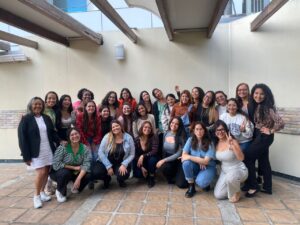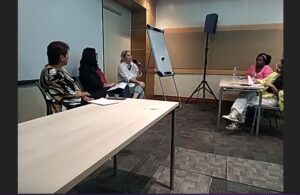On March 3, 4 and 5, Género en foco [Focus on gender] was held, the first meeting of the Network of Venezuelan Women Journalists. This is a diverse group of more than 150 women journalists, living inside and outside Venezuela, who are united by the interest of injecting a gender perspective into the journalistic narrative.
Género en foco was carried out in a hybrid format, with the in-person participation of a group of journalists in the city of Caracas and live online transmission of some panels. In addition, the event was held in partnership with Redes Ayuda and Free Press Unlimited, with the support of the Embassy of the United Kingdom and the Embassy of the Netherlands in Caracas.
The themes revolved around feminist journalism and a gender-based approach, but they also addressed issues such as Indigenous struggles, climate crisis, mental health, humanitarian emergencies, human trafficking, and sexual and reproductive rights.
Since June 2020, The Network of Venezuelan Women Journalists has functioned as an incubator of skills, ideas, projects, and powerful alliances. "We are interested in creating collaborative spaces, where knowledge can be exchanged and where we can participate in community building, in a harmonious and sister-like way," posted the Network members in the event's code of conduct.

The group of women attending the three-day Gender in Focus event. Photo: Network of Venezuelan Women Journalists.
A conversation that was heard over and over throughout the meeting was the importance of flexibility when it comes to feminist journalism, since there is no manual nor clear guidelines on the subject.
The conference began with a panel entitled 'Feminist journalist, why?' with the participation of Catalina Ruiz-Navarro, co-founder and director of Revista Volcánicas in Colombia, and Laura Aguirre, co-founder and director of Alharaca in El Salvador. Both agreed that feminist journalism is in a constant state of trial and error.
"It is very important as feminist journalists to be flexible. If you are a conscious feminist, you must be open to discussion and constant change because this is a movement that is in constant conversation. There is never going to be a static manual that lasts forever," Ruiz-Navarro said.
Venezuelan journalist and political scientist, Estefania Reyes, also spoke on this topic during her presentation 'Journalism will either be feminist or not.' Reyes said that talking about feminist journalism is hard because we still do not have a clear compass nor is there a recipe for what feminist journalism is.
"What we consider feminist today, in 20 years, may not be feminist enough because it will no longer be responding to the social demands of that time," Reyes said. "Feminist journalism involves personal effort. It involves being very critical, so as not to repeat those sexist and misogynist discourses. It also implies a transformation in the way we relate to ourselves and to other people, recognizing that from our positions of power and privilege we have contributed to sustain inequalities."
Drawing inspiration from the popular song “"BZRP Music Sessions #53" by Shakira and Bizarrap, in the Género en foco conference the importance of women journalists also billing and making money was discussed.

"You must be clear about your purpose, what moves you, in order to monetize it," Venezuelan journalist and media transformation consultant Carmen Riera said.
"Journalism has always faced these questions: How to monetize [content] without losing my editorial line. It’s a constant struggle between the one who needs to sell and the one who is safeguarding his or her editorial line," Laura Helena Castillo, journalist and co-founder of Bus Tv, said.
In this panel, Castillo was joined by Venezuelan journalist and media transformation consultant Carmen Riera, with whom she emphasized and invited the attendees to think about their purpose. "You must be clear about your purpose, what moves you, in order to monetize it," Riera said.
They also recommended seeking alliances and collaborations. As well as being disciplined and organized when receiving grant money, as this will allow them to open doors to new projects.
Moneywise, attendees also got advice on how to pitch and sell their stories to news outlets. This was presented by Eulimar Núñez, editorial manager of Telemundo Noticias.
"Any story can have a gender-based approach. But I prefer to look at it as the possibility of telling stories through a lens with which we see and write about any topic," said Núñez.
Since its inception, the Network has identified training as one of its members’ greatest needs. "We believe that training can make a difference in our professional development. And these workshops have been the result of that concern," Venezuelan journalist Maye Primera, who lives in the United States, said during the event’s closing.
In addition to training, the Network also seeks to support and nurture new generations of journalists along in their investigations. For this reason, as part of the event, four scholarships of 300 pounds sterling (US $360) each were awarded to support journalists in reporting their stories.
The winners will be working on topics such as the impact of the drought on the Guajira region of Venezuela, exploration of the sexuality of Venezuelan teens, family consequences of femicides, among others. The winners will also be mentored by members of the Network.
Primera took the opportunity to leave an assignment for each of the participants during the closing of the conference. She asked them to find a colleague and offer to mentor them, "Even if it's just to teach them how to make a chart in Excel," Primera said. "By being together, we are celebrating new role models in journalism and that fills me with joy. A journalism that recognizes virtue beyond manhood."